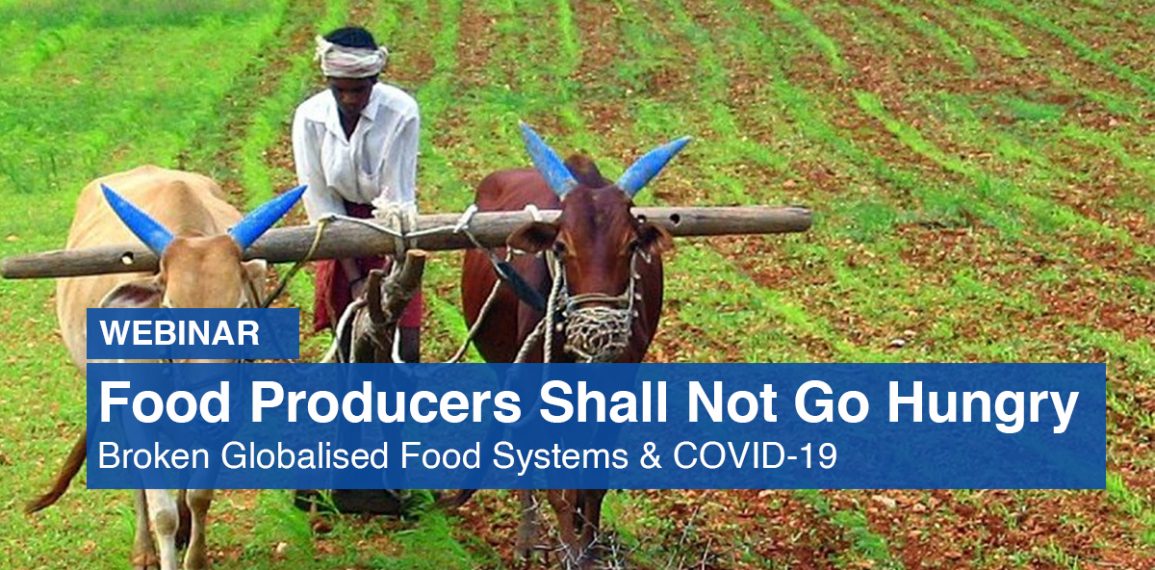Webinar: Food Producers Shall Not Go Hungry - Broken Globalised Food Systems & COVID-19
Asia Europe People’s Forum (AEPF) organised an international webinar titled “Food Producers Shall Not Go Hungry: The Broken Globalised Food System” in collaboration with Pakistan Kissan Rabita Committee. Over 600 viewers attended Live from different Asian and European countries, and hundreds more continue viewing the recording online.
The webinar was moderated by Yifang Slot-Tang of Germany and Farooq Tariq from Pakistan. Speakers include Hashim Bin Rashid, a member of Pakistan Kissan Rabta Committee/La Via Campesina, Professor Felix Anderl from University of Cambridge UK and Asienhaus Germany, Arie Kurniawaty from Solidaritas Perempuan Indonesia and Ashlesha Khadse from LA Via Compesina South Asia, India.
The speakers explained that small farmers, landless peasantry, agriculture workers and the rural poor in Asia were badly affected by the COVID-19 pandemic. They spoke not only about the larger crisis in agriculture in the region, but also regarding agrarian visions in Asia of paths out of the current pandemic. The crisis is all due to uneven land distribution, ecological change, and the increased marketisation of agricultural markets, they argued.
The speakers shared that the COVID-19 lockdowns have resulted in food rotting in fields, leaving food producers, including peasants, farmers, and agricultural workers, to go hungry. The mass return of tens of millions of migrant workers, many walking hundreds of miles on foot, to their home villages has raised serious questions about the precarity of the lives of dispossessed and landless poor across rural and urban settings. The tragedy of many returning to their home villages is that they no longer have land to cultivate, nor subsistence crops to get through these difficult times.
They said that when the World Food Programme is warning of a ‘famine of biblical proportions,’ the situation in rural Asia is most worrying. The region has a long history of famines in the past. Small-scale food producers, including peasants and fisherfolk, have been particularly vulnerable to the external shock caused by the COVID-19 lockdown that has disrupted agricultural markets.
They said that this has exacerbated an already bleak situation for Asia’s peasants, small food producers and working poor. One of eight people in the world were facing malnutrition due to a lack of adequate and healthy food before the COVID19 pandemic. This global hunger is a product of landlessness, uneven social relations and capitalist imperatives underpinning relentless dispossession of people from land, as well as inadequate infrastructure and logistics of food provisioning. This has led to a global food system designed to fail to address the needs of the most hungry, instead increasingly supplying food grown in the global South to the global North and not the other way around.
The speakers explained that the policies that were promoted for growing cash crops on agricultural land, such as cotton and palm oil, have made agricultural producers particularly vulnerable in the face of the COVID-related economic crisis in the global North.
Outsourced factories in Asian countries, including Bangladesh, Vietnam, Pakistan, and Indonesia, which supply European markets have found themselves shut down in the face of canceled orders by fashion chains based in Europe. The dependence on European markets for exports of both food and finished products has continued to weaken the economies of many Asian countries.
Replying to a number of questions, the speakers explained why Asia is home to nearly half a billion people that go hungry every day. While UN bodies like the FAO, explain this ‘food insecurity’ through the causes of poverty, conflict, climatic and technological challenges, they say next to nothing about the colonial and neocolonial processes that dispossess peasants of their land.
This has created a situation where millions no longer earn enough to access adequate food, as food continues to be wasted to keep prices high. Moreover, this has meant that the poorest people must continue eating cheap, unhealthy food that leaves long-term health impacts, making them particularly vulnerable to infectious diseases such as the COVID-19 pandemic.
COVID-19 has exposed the authoritarian nature of the regimes in Asian countries. In Pakistan, several dozens of farmers were arrested this week who wanted to go to Islamabad to protest against growing electricity bills. The same pattern is seen in India, Philippines, Indonesia, Bangladesh and several other Asian countries. The regimes in Asia have continued with the old policies of neoliberalism, treating COVID-19 as an opportunity to exploit even more.
The COVID-19 pandemic has only deepened existing inequality and injustice in a food system that was already broken, panellists explained in response to viewer questions. Mass famine is a serious concern as the COVID-19 situation has been made worse by locust swarms, floods and cyclones in the region. Precarious migrant and agricultural workers, the fisherfolk, the landless and homeless, and women and youth engaged in care work are far more susceptible due to worsening conditions of hunger, disease and indebtedness, compared to national elites and their Western counterparts.
This webinar was Part I of a two part series. The following webinar will continue the conversation on July 10, particularly centring Asian voices on the active struggles for food, land, seeds and livelihoods within their own contexts.
At this critical time in human history, marked by the climate crisis, a global pandemic and rapidly increasing inequality, the utter failure of the industrial food system to meet nutritional requirements, particularly in the global South, makes understanding, linking and supporting these struggles all the more urgent.
The speakers said that our grassroots and local efforts in Europe and Asia are essential to invigorating our communities in crisis. The speakers stressed the need for land reforms in all South Asian countries as a first step to solve the agrarian crisis. The feudal call has become a real hurdle in the path of growth of agriculture production and access to food who produce then. They declared the aspiration to fight for the cause, “No food producer shall go hungry”.



